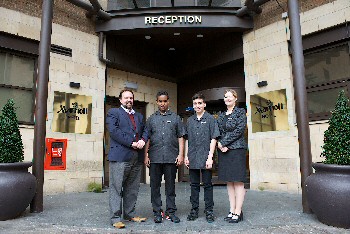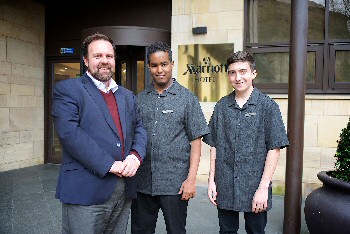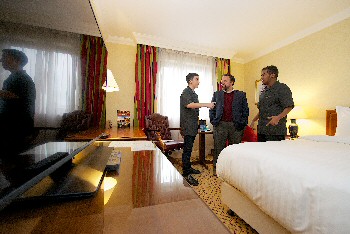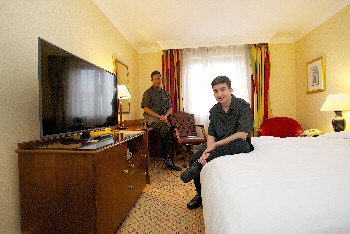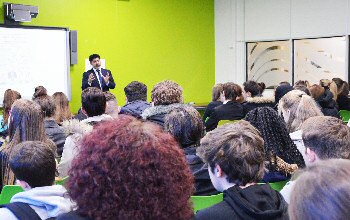 Your Online Newspaper for the Merseyside Area. |
|
| Latest Edition |
|
Archive |
|
PLEASE NOTE THAT SOME SECTIONS OF THIS PAGE ARE NO LONGER WORKING THIS PAGE IS NOW ARCHIVED FOR HISTORIC RECORD. |
|
> |
|
|
||||
|
|||||||||||||||||||||||||||||||||||||||||||||||||||||||||||||||||||||
|
|
|||||||||||||||||||||||||||||||||||||||||||||||||||||||||||||||||||||
|
|
|
||||||||||||||||||||||||||||||||||||||||||||||||||||||||||||||||||||
|
Young people with learning disabilities helped in to work
YOUNG people with learning disabilities
are being supported into work through a new scheme launched by Liverpool City
Council. Just 6% of young people with learning disabilities in the City are in
employment, and the aim of the scheme is to help them transition from education
in to the world of work, so they can live more independently and don't become
socially isolated.
The Council has teamed up with the Marriott Hotel, Hilton Hotel and grounds
maintenance partner Glendale Liverpool to offer Supported Internship placements.
They last an academic year with the pupils working for a different department in
the organisation each term.
Pupils from Sandfield Park School, Bank View High School and Myerscough College
are working 4 days a week and spending the other day in lessons to build
employability skills.
All the pupils are supported by a work coach who helps them get used to the
routine expected when in employment, instructing and supporting pupils to build
skills in the work place to complete work tasks to a high level.
Sarah Spoor, Learning Mentor and Inclusion Officer at Sandfield Park, said:- "I can honestly say that the Supported Internship programme is the best thing I have seen in all of the years I have been working with young people with special educational needs. For too long there have been poor outcomes for disabled young people leaving school or college and very few are able to find paid employment; this is not only unfair, but it means that so much talent and skill is not being used or developed and sadly impacts on disabled young people's aspirations and hopes for the future. It is a chance to develop work skills with support from a work coach to give the young person a real chance to get meaningful and paid employment. I have seen all 3 young people grow so much in confidence and maturity and they are more independent and developing great skills."
Becky Cooper, HR Manager for the Liverpool Marriott Hotel said:- "The supported Internship program is an exciting opportunity for us to work closely with our community partners to enhance the experience of young people with disabilities and equip them with the necessary skills to go on to paid employment. Allowing us to access a new pool of talent, the programme also provides our employees with exceptional personal development opportunities as they work with and mentor the young people. We have been working with the students for over 12 months in the lead up to this project and since starting the Internship in September they have settled into Marriott exceptionally well and already feel like part of our team. In a short space of time we have seen huge positive change in their confidence levels and communication and they are doing a great job within the Housekeeping department. We are excited for the next stage in the internship and look forward to seeing them to continue to thrive."
John Stanton, aged 17, from Sandfield Park
School, who is working at the Liverpool Marriott Hotel in Queen Square, said:-
"I really enjoy working at the Marriott Hotel as the staff are really nice
and helpful. I think supported internships are good as it gives a chance to work
in a work place. I would like to get a job here when the Internship has
finished. I enjoy everything about the placement, I love getting up the mornings
to go to work and doing jobs really well and I am proud of myself." |
|
Formby Christmas Lights Switch On 2017
ON Sunday, 26 November 2017, the Formby Christmas Lights will be turned on. This year, Billy Butler and Wally Scott will be pushing the plunger… Also attending will be Miss Southport, Gwen Raby and Miss Liverpool City Region, Elli Wilson. The events start at 1pm and lights go on at 5pm… Do not miss what will be a fantastic event… For more information go to the Formby Christmas Lights Facebook Page. This year's Formby Village Nativity performance, by Churches Together (CTIFAH) will be held on Sunday, 10 December 2017, from 2pm, within the grounds of Formby Pool. College students get career advice from the top
STUDENTS at Hugh Baird College were treated to career advice and guidance from a very special guest recently as they were visited by Head of the Peer Supervision and Risks Division at the Bank of England, Mr Tanveer Hussain. The visit was part of a series of events taking place in and around Liverpool that have have been unveiled in the Bank of England's new educational resources. These materials aim to teach students about the economy and the role of the Bank of England and are designed to be used in PSHE and Citizenship classes. The visit saw students from Business, Accounting and Law asked Mr Hussain a wide variety of questions on his current role, his background and the previous roles he has held in banking. Having worked for the Bank of England for many years and currently the Bank's
Prudential Regulation Authority, Tanveer is responsible for supervising 60
international firms. This involves contingency planning, crisis management and
making sure those 60 firms don't put customers or the UK's financial system
at risk.
Tanveer discussed the history of the Bank of England, how the Bank came into
existence and the Bank's responsibility and mission. This then lead him onto
discuss the financial crisis, the state of the current economy and Brexit.
The talk also proved a great way for the students to hear about the different
career opportunities and routes in to the finance world that are open to them
after they leave the College. CIOT welcome Government moves to simplify and update approach on employee expenses THE Chartered Institute of Taxation has
welcomed moves to simplify the Taxation of employee business expenses. The CIOT
argues that the system for exempting from Tax employees' employment expenses and
certain employer provided:- 'benefits' needs to be simplified if it is to
keep pace with changes in the labour market and the move away from 'traditional'
employment. |
|||||||||||||||||||||||||||||||||||||||||||||||||||||||||||||||||||
|
| |||||||||||||||||||||||||||||||||||||||||||||||||||||||||||||||||||||
|
|||||||||||||||||||||||||||||||||||||||||||||||||||||||||||||||||||||
| |||||||||||||||||||||||||||||||||||||||||||||||||||||||||||||||||||||
